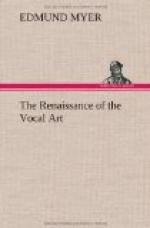We should never lose sight of the fact that there is a true science of voice, and that the art of song is based upon this science. The true art of song, however, is not so much a direct study of the physical or mechanical action of the parts, as it is a study of the spirituelle side; a study of the forces which move the parts automatically, in accordance with the laws of nature. In other words, voice, true voice, is more psychological than physiological; is more an expression of mind and soul than a physical expression or a physical force. It is true, the body is the medium through which the soul, the real man, gives expression to thought and feeling; and yet voice that is simply mechanical or physical is always common and meaningless and as a rule unmusical. The normal condition of true artistic voice is emotional and soulful.
ARTICLE THREE.
The two prevailing systems.
The misunderstanding or the misapplication of any principle, theory or device, always leads to error. This was eminently true of the misunderstanding and misapplication on the part of many writers and teachers who based their systems upon the theories of the scientists and the self-styled scientists. The result is evident; it is that which is known as the local-effort, muscular school of the nineteenth century; the school which to this day so largely prevails; the school which makes of man a mere vocal machine, instead of a living, emotional, thinking soul.
The local-effort school attempts, by direct control and manipulation of muscle and of the vocal parts, to compel the phenomena of voice. In this respect it is unique; in this respect it stands alone. The truth of this statement becomes evident when we stop to consider that in nothing known which requires muscular development, as does the art of singing, is this development or training secured by direct manipulation and control of muscle. There is nothing in the arts or sciences, nothing in the broad field of athletics or physical culture, nothing in the wide world that requires physical development, in which the attempt is made to develop by direct effort as does the local-effort school. Hence we say the mistake they make is in attempting to compel the phenomena of voice, instead of studying the conditions which allow them to occur. It might be interesting, it certainly would be very amusing, to enumerate and illustrate the many things done under the name of science, to compel the phenomena of voice; but space will not permit. Many of them are well known; many more are too ridiculous to consider except that they should be exposed for the good of the profession.
The result of all this direct manipulation of muscle is ugliness—everywhere hard, unmusical, unsympathetic voices. The public is so used to hearing hard, muscular voices that the demand for beautiful tone is not what it should be. In fact, it is not generally known that it is possible to make almost any voice more or less beautiful that is at all worth training. The hard, unmusical voice of the day is a hybrid, unnatural and altogether unnecessary voice. Physical effort in singing develops physical tone and physical effect. Common tone makes common singing. A great artist must be great in tone as well as in interpretation.




